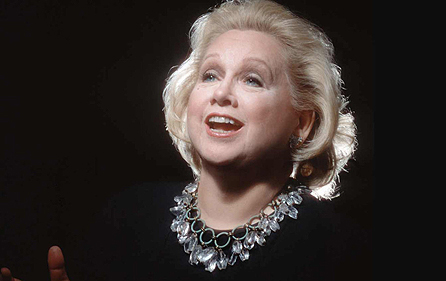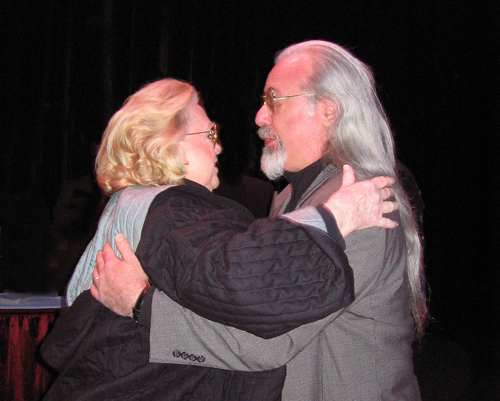Music: Barbara Cook: A Remembrance
By Evan Guilford-Blake
arttimesjournal August 22, 2017
Barbara Cook, who died on August 8th, would have turned ninety on October 25th. New Yorkers loved her for the treasure she was, but she was barely known to the rest of America.
 Barbara Cook |
I first encountered her in a small, unimpressively appointed West Side nightclub, whose name I’ve long since forgotten, sometime in 1973 or ’74. I was a child of the Midwest who enjoyed musical theatre but who, frankly, didn’t much care for The Music Man (having been subjected repeatedly to Shirley Jones on the soundtrack of the film version). I hadn’t heard the Original Cast albums of Plain and Fancy (although I had actually played the male lead in a summer camp production when I was fourteen), She Loves Me or Candide. Thus, when Erica, the woman I was dating, told me, breathlessly, that Barbara Cook was going to appear, my reaction was “Who?” Sarah Vaughn excepted, nightclub chanteuses weren’t really my cups of tea. But Erica and I were close. I sighed and smiled and let her drag me. It’s what you do for love.
We sipped our drinks from a table less than twenty feet from the “stage” — a smallish elevated platform with a grand piano and a microphone on a stand, covered by a clean but dingy-colored carpet that matched the carpet on the floor — while Erica, a New Yorker from birth, excitedly repeated Cook’s history. I nodded. I wanted to appease her and I wanted to agree with her. I hoped I’d at least like this woman Erica called the greatest Broadway singer who’d ever lived.
Still, it was a weeknight and the place was less than half-filled: Apparently I wasn’t the only one who was unaware of her pedigree.
At 8:00, the announced show time, a tall, thin man in a tuxedo stepped onto the stage, without introduction, and sat at the piano. This, I was to learn much later, was Wally Harper. Harper, besides being her pianist, was Cook’s collaborator, as well as her arranger and a songwriter who, with David Zippel, penned one of her most endearing hits, the insider-joke “The Ingénue” which contains the immortal lyric “And movie roles you live to do/ they give to Shirley Jones to do.”
There was a smattering of applause; he nodded. The house lights dimmed, the stage lights rose (there weren’t many, just a large handful of PARs — we called them “tin cans” when I was a kid — and a few spots), and Harper played a brief medley of Barbara Cook’s Greatest Hits, virtually none of which I knew, although Erica sighed mightily at each segue.
He finished with a small flourish, bowed in acknowledgement at the polite applause, and vamped into “Carolina in the Morning.” It’s a mundane song everyone knows; we learned it at our mothers’ knees, and it is not what I was expecting a legendary Broadway singer to open her first nightclub set in ten or so years with. But apparently a good number of those in attendance did: There was more applause; this time it was enthusiastic. The club may have been half full, but many of those there were, like Erica, long-time followers.
And then, and then... onto the stage, dressed in a not particularly flattering, calf-length, pastel-with-glitter evening gown, stepped a short, two hundred fifty pound blonde-haired woman in heels, wearing a smile that looked uncomfortably glued-on. She walked the dozen steps to the mic, lifted it from its cradle, listened to several bars of the vamp, and began to sing.
If you’ve ever stepped on your porch on an ordinary summer evening and found the aurora borealis waiting on the horizon, or looked out your window on a dull winter day and seen the sun rising over the Andes, you understand what it’s like to literally have your breath taken away. To be stunned. To have whatever expectations you may have had exploded in a nuclear flash. So it was: By the time Barbara Cook had sung eight bars of “Carolina in the Morning” I’d been transported. Dumbfounded. The song may have been mundane, but she transformed it: The melody and lyrics were suddenly sublime.
It is not hyperbole to say I was, in that moment, re-formed, musically and aesthetically: Where had I been all her musical life? When she finished her second number, “Vanilla Ice Cream” from She Loves Me, one of her early trademarks, I was applauding as enthusiastically as the rest. And when she sang “Glitter and Be Gay,” probably the most difficult musical number ever foisted upon a Broadway singer, I was in tears. It’s how I react to being buried under a barrage of artistry.
And so it went. For close to two hours I sat there, all-but oblivious to Erica and everything else. Between sets I sipped my drink, said as little as possible, and savored the concert still going on in my head. When the evening ended I left reluctantly, as though what I’d experienced had to be confined to the space in which I’d experienced it in order to continue to exist. Of course it didn’t. As Rick might have said to Ilsa, “I’ll always have that night club.” Oh, yes.
I bought every album she’d made, OCs and studio recordings, and played them constantly. I told everyone I knew about her. (I was in theatre. So were many of my friends, but most were as unaware of her as I had been.) I went to every club at which she appeared. And every time, she was better than the last.
By the time she re-became a legend, via her 1980 Carnegie Hall concert, I’d left New York and was consigned to hearing only her recordings. I lived in Chicago then, and through the next two decades. As I recall she appeared there only once; I was out of town. Oh, well, I sighed, there’ll be a next time.
There was, but it was a long time coming.
I got married in 2000 and moved to Atlanta, Cook’s hometown. I was still actively involved in theatre (as a playwright, then) and my wife, Roxanna, was a theatre enthusiast. We went to shows often.
Cook hadn’t done anything on Broadway since 1972. She hadn’t done a Broadway musical since 1971 (though she’d been cast in 1988’s ill-fated Carrie, the Musical, she left the show during its London tryout). I sang her praises to Roxanna, and played the albums. But although she loved musical theatre Roxanna, like most non-New Yorkers, had barely heard of her, and had never heard her live.
 Barbara Cook and Evan Guilford-Blake |
I wanted her to. Most great singers project an electricity in concert that simply can not be captured in a studio. Barbara Cook was the archetype. Thus, I planned a trip to New York for us, to see Cook’s Lincoln Center show in 2002.
She was, then, 74, and she’d lost the top of her range. At one point, Wally Harper vamped “Glitter and Be Gay.” The audience burst into anticipatory shouts and applause but, with a small, sad laugh, she said, “Don’t worry, I’m not going to sing that. I can’t reach those notes anymore.” We shouted and applauded anyway, and she gave a glorious rendition of her Mostly Sondheim repertoire. Roxanna was as stunned as I’d been that first time, twenty-eight years before.
I was able to see her live twice more, in Atlanta, where she’d been born into less-than-ideal circumstances and escaped from them through her talent and with the help of those who believed in her. (That’s a story for another day.)
The last time, in 2005, Roxanna and I bought tickets the first hour they were available: Front row, center, and expensive as hell. But we were rewarded: We were among the early birds who were invited to a small, post-show, onstage reception, where we could share a glass of wine and talk with its star, and even have our photo taken with her. I have three pictures from that event. In one, Barbara (she told me to call her that: “Ms. Cook is too formal and Miss Cook is embarrassing”) and I are standing side by side looking into the camera. In the other two we are embracing. I remember, I cried. It was, as the kids are wont to say, awesome.
I got to tell her how much she and her music had meant to me over the years — which is true: I’m a writer, and sometimes the rush I felt listening to her sing “Stars” or “What’ll I Do” or “Losing My Mind” or even “Carolina in the Morning” was enough to propel me through a chapter or a scene that simply to refused to happen via any other stimulus. Sometimes listening to her let me feel and express emotions that were hiding beneath the tensions of my life.
And she signed my She Loves Me album cover. It’s one of the few things I want at my funeral service.
No question: Barbara Cook was a human being and like all human beings, she had flaws. She was, I’ve heard, sometimes unkind and, reputedly, sometimes difficult to work with. But I will always remember her as a talent nonpareil, a legendary teacher and a woman who broke through the system’s shackles to make an indelible mark. She was sui generis.
RIP, Cunégonde. Glitter as you always did, and be gay.
Evan Guilford-Blake (@ejbplaywright) is a novelist, short story writer and playwright (you can find his work on Amazon) who lives in the Atlanta area and worships Barbara Cook.
